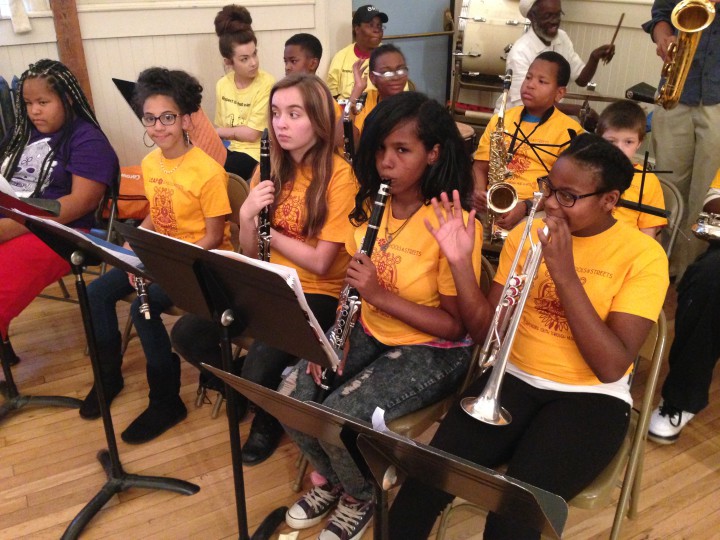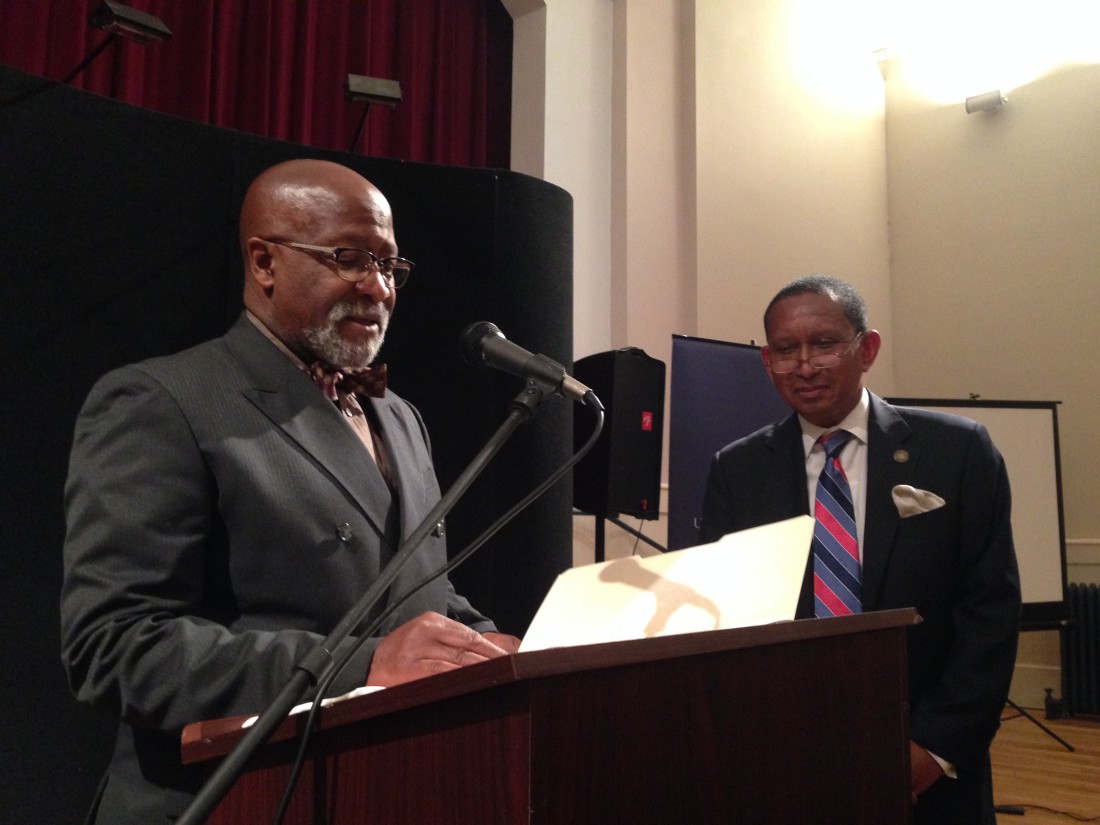Among many who fought for equality, Asheville native Floyd McKissick Jr. and his family have been on the front lines of the Civil Rights struggle, both locally and nationally, for more than a century.
McKissick gave the keynote speech at the second Annual African Americans in WNC Conference Oct. 22 at the YMI Cultural Center, hosted by the UNC Asheville Department of History.
He called Asheville a stronghold of African-American culture and activism. McKissick, who currently lives in Durham and holds a seat in the North Carolina Senate, talked about growing up in Asheville during the Civil Rights movement of the 1960s and in the orbit of his father, Floyd McKissick Sr., a dynamic and passionate proponent of African-American advancement.
Before McKissick spoke, the LEAF in Streets & Schools Delta Jazz Band played a short set of jazz standards. The youths played brass and woodwind instruments, led by teaching artists Gary Bradley on keyboard, Katie Oaks on saxophone, and Imhotep Dlanod on a highly customized New Orleans-style drum kit. Dlanod’s mix of jazz rhythms and marching band beats kept the room relaxed as soloists of differing skill levels took turns improvising. The tallest young man in the group played his saxophone standing up with calm precision.

People filled their plates with food, mingled and eventually found seats. The band stretched out one last tune to loud applause before presenters took the podium.
Darin J. Waters, assistant professor of history and special assistant to the chancellor for outreach and engagement at UNC Asheville, outlined the three objectives of the conference: “Dismantle the myth that there are no African Americans” in Western North Carolina; “provide new historical data for educators” to integrate into their curricula; and “demonstrate the seriousness” of African American history in this region.
Sarah Judson, associate professor of history and Africana Studies at UNC Asheville, gave a Special Presentation for Community Service to Jonnie Grant, honoring Grant’s 10 years as owner and publisher of the Urban News. Grant noted her publication’s mission to provide “a voice of inclusion,” which was followed by a long and energetic standing ovation.
Maya Newlin then introduced McKissick. Newlin — a UNC Asheville student and president of the campus’ Student Government Association, member of the Board of Trustees and member of the Black Student Association — listed McKissick’s many achievements and acts of service, which include a JD degree from Duke University School of Law, a master’s in public administration from Harvard University, a master’s in regional planning from the UNC Chapel Hill, eight years in the North Carolina Senate where he hold the position of senior deputy Democratic leader, eight years as a member of the Durham City Council ending in 2001, and national recognition from the Humane Society as Legislator of the Year in 2015.
Sen. McKissick began his remarks by thanking several people for their community service. “My distinguished colleague from the North Carolina House of Representatives, John Ager, thank you for being here,” he said. He then thanked Terry Bellamy, Asheville’s first African American mayor, adding, “while she may not be your mayor today, I will always think of her fondly in terms of her contributions here.”
Calling Asheville “a diverse community,” McKissick explained that “it’s always had African Americans involved in leadership. It’s always had people that were active and engaged. My father was born here and raised here. And, it was the inspiration that he received while growing up in Asheville that inspired him to become an activist in civil rights.”
He described his father as a powerful force for change. Floyd McKissick Sr. was the first African American to attend the Law School at UNC Chapel Hill. He went on to become national leader of the Congress of Racial Equality, and was noted for organizing the Freedom Riders. McKissick Sr. was a close friend and ally of Dr. Martin Luther King Jr. The two were often seen together in the media spotlight. They marched hand-in-hand, met with President John F. Kennedy on the White House lawn, and shared the cover of Newsweek’s May 15, 1967 issue, along with three other civil rights activists — Whitney Young, Stokely Carmichael, and Roy Wilkins — under the headline, “Which Way for the Negro Now?” According to McKissick Jr., his father could call the White House during Nixon’s tenure, and get a call back within a few hours.
Sen. McKissick offered numerous examples of what it was like growing up in the McKissick household, when, many nights, his home had to be protected with armed guards on the porch. Regardless of written threats left by Ku Klux Klan members, the McKissick children were encouraged to stay focused on school. Scholastic achievement was integral to attaining equality, they were taught. Thus, his parents prepared him and his siblings each night for the experience of being the only African Americans in each of their respective grade levels. One-third of the class was hostile toward him, McKissick Jr. noted. Another third was sympathetic, but did not show outward support. And, the last third, usually the less popular kids, became his allies. The McKissick home was a haven and staging ground, not only for blacks, but also Asian students, and people of all colors to find safe harbor, socialize and organize toward a more inclusive future for all.
This intimate view of the McKissick family’s Civil Rights legacy, as seen through the eyes of the senator, was followed by McKissick Jr calling for everyone in the room to engage the political system, attend rallies and marches, find allies and continue “working in teams” to overturn Citizens United, expand voting rights, and increase teacher pay.
The evening ended with an announcement by Dwight Mullen, professor of political science at UNC Asheville, on behalf of Mayor Esther Manheimer, that the city of Asheville has designated Oct. 22 as McKissick Family Day.




Before you comment
The comments section is here to provide a platform for civil dialogue on the issues we face together as a local community. Xpress is committed to offering this platform for all voices, but when the tone of the discussion gets nasty or strays off topic, we believe many people choose not to participate. Xpress editors are determined to moderate comments to ensure a constructive interchange is maintained. All comments judged not to be in keeping with the spirit of civil discourse will be removed and repeat violators will be banned. See here for our terms of service. Thank you for being part of this effort to promote respectful discussion.